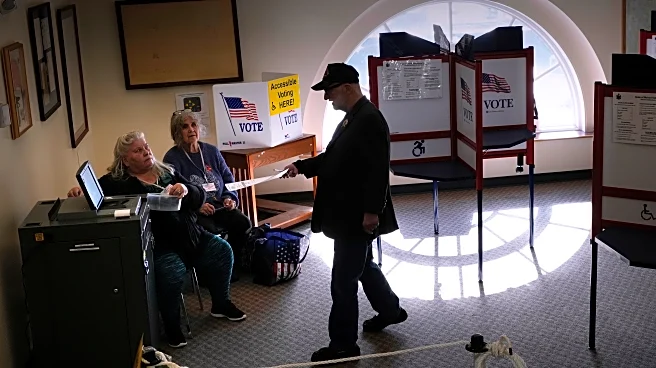PORTLAND, Maine (AP) — Maine and Texas are the latest states to become involved in a nationwide Republican push to enact strict voter ID laws and highlight the exceedingly rare problem of noncitizen voting, with voters set to decide ballot measures on those issues Tuesday.
Texas voters approved a measure to amend the state constitution to add “persons who are not citizens of the United States” to the list of those excluded from participating in elections.
Meanwhile, voters in Maine rejected a sweeping proposal centered on voter ID. The initiative would implement a photo ID requirement for voters, limit the use of drop boxes for returning completed ballots and make numerous changes to the state’s absentee voting system.
Proponents said the initiatives would safeguard elections, while opponents claimed they are intended to make voting more difficult or address issues that aren’t major problems.
National Democrats heralded the defeat of the Maine proposal as a victory for voting rights.
“Question 1 would have ended absentee voting as we know it, further diluting the voting rights of people with disabilities, seniors, and working Mainers who are unable to take the day off from work to vote,” said Democratic National Committee Chair Ken Martin.
Voters decided the measures at a time when President Donald Trump and national Republicans have pushed for new voting restrictions. Republicans have promoted a documentary proof of citizenship requirement at the national and state levels, but with limited success.
Maine Gov. Janet Mills is one of many Democrats in the state who spoke out against the voter ID initiative. She said she saw it less as a chance to shore up elections and more as an attack on the right to vote itself.
“Whether you vote in person or by absentee ballot, you can trust that your vote will be counted fairly. But that fundamental right to vote is under attack from Question 1,” Mills said ahead of the final day of voting.
Proponents of the voter ID push said it’s about making sure legal votes count in the state.
The Maine proposal stated that it also would eliminate two days of absentee voting, prohibit requests for absentee ballots by phone or family members, end ongoing absentee voter status for seniors and people with disabilities and limit the number of drop boxes in the state, among other changes.
The initiative was considered as Maine investigates an allegation that dozens of unmarked ballots, intended for use in this year’s election, were discovered inside a woman’s Amazon order. The secretary of state’s law enforcement division is investigating the discovery with assistance from the FBI and other state authorities, Maine Secretary of State Shenna Bellows has said.
The Texas proposal arrived as Republicans in the state also have pushed for proof-of-citizenship proposals for voters. A Texas Senate bill on the subject failed to gain full legislative approval before lawmakers adjourned in June.
Voters in Texas already must attest to being a citizen when they register to vote. Thirteen other states have attempted similar citizenship voting ballot initiatives in recent years, and all of them passed easily. More are expected next year.
Voting by noncitizens is already illegal and punishable with a felony and possible deportation. A handful of cities across the country allow noncitizens to vote in certain local elections.
The League of Women Voters of Texas released a video in September highlighting some of the proposal’s pros and cons. It said supporters favor the constitutional amendment because it would be difficult to change in the future, while opponents believe the amendment is unnecessary because noncitizen voting is already rare and illegal in Texas.
















